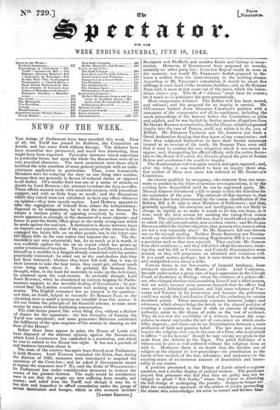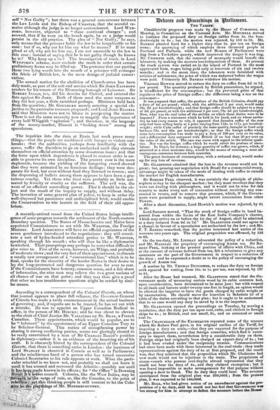NEWS OF THE WEEK.
Tits doings of Parliament have been manifold this week. First of all, the Tariff has passed its Rubicon, the Committee on details, and has come forth without damage. The debates have been somewhat less protracted, and much less interesting, than might have been expected. Particular interests raised objections to particular items, but upon the whole the discussions were of no very practical character. The most prominent were those which involved the trite assertion of some general principle with an indis- criminate application to particulars. Thus, some honourable Members were for reducing the duty on one thing after another, i
because they are' generally in favour of reduced duties or opposed to all duties. Of a similar kind was one of a series of attacks on details by Lord Howl-ex—his attempt to reduce the duty on coffee. T-hose efforts seemed made with uncertain purpose, with precarious support, and with as little hope as result ; and the discussions which they raised were not calculated to have any effect whatever on opinion—they were merely useless. Lord Howie& appears to take the segregation of himself from others for independence : disposed to be independent, he is not the more so because he adopts a random policy of opposing everybody by turns. He never appeared so strongly in the character of a mere objecter ; and hence in part the feeble effect given to the really strong case which he made against the coal-tax. A distinction is drawn between taxes on imports and exports, that if the production of the former is dis- couraged the injury falls on an alien people, but in the latter case the injury falls on the very nation that imposes the tax. The dis- tinction_is not very subitantial; but, for as much as it is worth, it was available against the tax on an export which has grown up under a remission of taxation. Yet even here Lord Howice showed himself as a meddler in a bargain already concluded with the parties practically interested : he cried out to the coal-dealers that they had been betrayed Cwhereas they knew full well, that it was to their interest to take the best terms they could get, without much noise being made about it. So probably Sir ROBERT PEEL thought, when, in the hunt for materials to make up the deficiency, he pounced upon the coal-owners. So probably thought Lord JOHN Russmx, when he abandoned an interest begging for Parlia- mentary support, to the merciful dealing of Government : he per- ceived that his London constituents had nothing at stake in the matter. The English consumer has no interest in the question : and that, no doubt, helped to reconcile Sir ROBERT PEEL to the obtaining even so small a revenue as 140,0001. from this source: it did not violate the principle of his financial scheme, to raise more money by taxes without burdening consumption.
The coal-duties passed, like every thing else, without a shadow of chance for the opponents : the last formality of framing the Tariff was completed ; and some gamesome Members celebrated the fulfilment of the opus magnum of the session by dancing on the floor of the House !
Before these lines appear in print, the House of Lords will have disposed of the abstract opinion against the Income-tax, which Lord LANSDOWNE has embodied in a resolution, and which he was to submit to the House last night. It has not a particle of real business intention about it.
The state of the country has again been forced upon Parliament, in both Houses. Lord RADNOR reminded the Peers, that, during the distress of 1826, measures were introduced to suspend the operation of the Corn-law ; and be asked if Government meant to repeat the measures now ? No, said the Duke of WELLINGTON ; for Parliament has under consideration measures to remove the causes of the present distress. The reply would be satisfactory were it not that the people are now suffering from results, not causes; and relief from the Tariff, real though it may be, is too slow and imperfect to afford consolation under the pangs of actual destitution and hunger, which at this moment desolate Stockport and Sheffield, and madden Ennis and Galway to insur- rection. However, if Government have proposed no remedy, certainly no other party has : Corn-law Repeal would be none at the moment: nor would Mr. FERRAND'S foolish proposal to dis- burse a million from the state-treasury to the working-classes. According to Mr. VILLIERS'S calculation, it would be about five shillings to each head of the destitute families; and, as Sir ROBERT PEEL said, it must at last come out of the taxes, which the indus- trious classes pay. This fit of " distress" must have its course; let it teach us to anticipate the next preventively. More compromise debates! The Belfast writ has been moved, and refused ; and the proposal for an inquiry is carried. Mr. O'Corteem, backed JOHN STEPHEN CROPPER'S petition with a statement of the compromise and all its machinery, including the mock proceedings of the lawyers before the Committee, so plaint and explicit, and he was backed by further precise allegations from Sir YIENRY BARRON so conclusive, that the House, which had granted" inquiry into the case of Penryn, could not refuse it in the case of Belfast. Mr. EMERSON TENNENT and Mr. JOHNSON put forth a literal declaration denying that they know of any compromise; and thus they subjected themselves to have their formal statement- treated as an evasion of the truth : Sir ROBERT PEEL even said that it went to confirm the very allegation which it was meant to oppose; and, disregarding his official affinity with the active Secre- tary to the Board of Control, the Premier played the part of Junius Brutus and condemned the youth to inquiry.
The Southampton writ was again moved, and again opposed ; and, after the delay, it was resolved to have an inquiry there also. But neither of these new cases was referred to Mr. Rossuces Committee.
An elector qualified by occupancy, who removes from one tene- ,
ment to another in the interval between two registrations, is by the existing laws disqualified until he can be registered. again. Mr. MILKER GIBSON introduded a bill to retain to him the franchise for the remainder of the year. The rationale of that measure is, that the elector has been pronounced by the coarse classification of the Reform Bill a fit man to elect Members of Parliament ; and that, generally speaking, his character and intelligence are not likely to change so rapidly as to make it unsafe to let him run loose, as it were, until the next season for marking the voting-flock comes round. The objection to the bill was, that it would afford a loophole to admit the old corruptionists, non-resident voters; and Sir.Jamss GRAHAM added the further objection, that persons who remove often are not a very reputable class! So Mr. GIBSON'S bill was thrown out on the second reading. Neither Home Secretary nor Premier would say whether their forthcoming Registration Bill is to contain a provision such as that now rejected. They exclude Mr. Grasow from their confidence ; and they will either adopt his measure, treat- ing him and his bill as CANNING and Catholic Emancipation were treated, or they will perpetuate an admitted and vexatious eviL It is a small matter, perhaps ; but it were better not to be unwise and undignified even about a trifle.
Certain forms in our law-courts, of immoral tendency, have
attracted attention in the House of Lords. Lord CAMPBELL brought under notice a gross case of legal oppression in the Circuit Court of Justiciary at Stirling ; where the evidence of a police-offi- cer, who charged another with assaulting himself and a third person, was set aside, because some persons deposed that the officer had. once uttered Atheistical opinions and had some volumes of VOL.. TAIRE and VOLNEY in his possession, and because the policeman could not satisfy the Lord Justice Clerk of his orthodoxy on certain doctrinal points. These unseemly contests between judges and witnesses, which always lodge the bench in the absurd position of courting a controversy to close it with an exercise of arbitrary authority, point to the disuse of oaths as the test of evidence. They do not test the credibility of a witness, because the com- pulsion to swear supersedes the act of conscience on which credi- bility depends; and there can be no discrimination between a mere profession of faith and genuine belief. The law does not always require the religious test—as in the case of a Peer, who is admitted_ to affirm " on his honour," though he may occupy any grade in the scale from the Atheist to the bigot. The penal liabilities of a witness can be just as well enforced without the religious form as with it. Moreover, there is no doubt that the familiar use of religion as the adjunct to law-procedings—its prostitution in the hands of low menials of the law, informers, and perjurers—is the creating cause of an immense amount of desecration and immo- rality in our courts.
A petition presented in the House of Lords raised a cognate
question, and a similar display of judicial wisdom. The petitioner prayed that prisoners who feel that they are guilty may not ba obliged to plead " Not Guilty " where they demur to admitting , the full charge or undergoing the penalty. Judges no longer ex- hibit the scandalous spectacle of the arbiter of justice persuading the sinner who acknowledges his error to retract and declare him- self " Not Guilty "; but there was a general concurrence between the Law Lords and the Bishop of CHESTER, that the scandal re- mains although the judge is no longer contaminated. Lord Wym- roan, however, objected to " these continual changes"; and avowed, that if he were on the bench again, he as a judge would persist in the old practice. The plea of " Not Guilty,' he says, only means that the prisoner holds the law to be inapplicable to his case : but if so, why not let him say what he means ? If he must plead at all, why not let him say, I am not amenable to the law in this case ; instead of saying that he is not guilty though he knows be is ? Why keep up a lie ? The investigation of truth, in Lord Wiirostes scheme, must exclude the truth in order that certain preliminary forms may be filled up. The pretence that not putting those two lying words into the mouth of a prisoner will endanger the fabric of British law, is the mere dotage of judicial conser- vatism.
The annual motion for the abolition of Church-rates has been duly made, as part of the suit and service which Sir JOHN EASTHOPE renders for his tenure of the Dissenting borough of Leicester. Sir Roamer Nous, too, did his devoirs for Oxford, and entered the lists against Sir Jowl. Both of them used the same weapons as they did last year, a little tarnished perhaps. Ministers held back from the question ; Mr. GOULBURN merely entering a special ob- jection to the particular measure proposed ; and Lord JOHN RUSSELL said that Ministers were not to blame in postpcning the matter. There is not the same necessity now to magnify the importance of every half-Whiggish " agitation "; and therefore, in the language of the money-market, Dissent is "looking down" among the speculators.



























